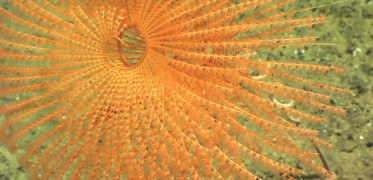Cold Corals in Hot Water

In the wake of dramatic glacier retreat and ice shelf collapses on the Western Antarctic Peninsula, a University of Maine marine scientist will explore how Antarctic corals, which provide habitat for thousands of connected species, cope with warming ocean water.
Rhian Waller, an associate research professor in the School of Marine Sciences, received a National Science Foundation grant of more than $381,380 for her two-year project titled “Cold Corals in Hot Water — Investigating the physiological responses of Antarctic coral larvae to climate change stress.”
Cold-water corals, Waller says, are “important ecosystem engineers” that benefit many organisms, including commercially important species such as rockfish, orange roughy (deep sea perch) as well as young cod, and many crab species.
Accelerated climate change, she says, “is likely to affect in presently unidentified ways the many benthic (organisms living on or in sea or lake bottoms) marine invertebrates that live within narrow temperature windows along the Antarctic Continental Shelf.”
In this first systematic study of the larval stages of polar cold-water corals, Waller will examine whether larvae can develop normally in the next century.
Scientists predict water around the Western Antarctic Peninsula, which has warmed nearly 1 degree Celsius the last 50 years, could warm at an even more accelerated pace the next 50 years.
Understanding how the coral larvae react will help scientists predict future changes in those benthic communities around the planet, says Waller, who is based at the university’s Darling Marine Center in Walpole, Maine.
Waller will conduct climate change experiments on coral larvae at Palmer Station on Anvers Island in Antarctica, just north of the Antarctic Circle, beginning in November 2014. The Western Antarctic Peninsula, she says, is experiencing “rapid climate change at one of the fastest rates of anywhere on the planet.”
Waller’s findings will be placed on a research website and distributed via social media. She’ll also make presentations in local schools.
In March 2013, Waller was featured as a risk taker in the “New Age of Exploration” in National Geographic Magazine. The National Geographic Society, one of the largest nonprofit scientific and educational institutions in the world, is celebrating its 125th birthday in 2013 with a yearlong series highlighting 21st-century explorers who “press the limits.”
Waller has pressed the limits of diving during more than 40 expeditions around the planet. In a submersible, in 2005 she plunged to a depth of 3,600 meters for corals on the New England Seamount chain.
Contact: Beth Staples, 207.581.3777
